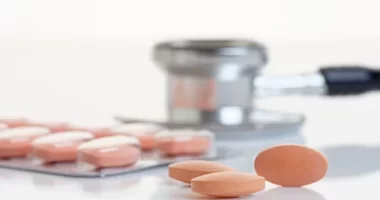High cholesterol supplements: Almost 40 percent of people in the UK have high or borderline high levels of bad cholesterol, leaving them at risk of blocked blood vessels, heart problems and strokes. While eating a balanced diet with less fatty food, exercising more and quitting cigarettes and booze are key in reducing cholesterol, there are six supplements you can take to help. Express.co.uk chatted to Dr Deborah Lee from Dr Fox Online Pharmacy to find out how to lower your cholesterol using supplements.
About 80 percent of the cholesterol in our body is made in the liver, while the rest is absorbed from the food we eat.
Although we often hear bad things about the fatty substance, it plays a vital role in the functioning of your body.
You need cholesterol in every cell of your body to make vitamin D and steroid hormones to keep your bones, teeth and muscles healthy.
Cholesterol is also necessary to make bile and digest the fats that you eat.
Cholesterol is lipophilic meaning it dissolves well in fat.
Dr Lee explained: “Cholesterol cannot circulate loosely in the blood, so your liver turns them into little parcels called lipoproteins and triglycerides to transport it around the body.”
There are good lipoproteins (high-density lipoproteins or HDL) there are bad lipoproteins (Low-density lipoproteins or LDL).
HDL carries cholesterol away from the heart and the arteries to be cleared in the liver, whereas LDL carries cholesterol to your heart and arteries, where fatty plaques can then develop.
Dr Lee said: “These then block the flow of blood to the tissue distal to the blockage. A raised LDL cholesterol is generally bad, whereas a raised HDL is general good.”
Raised cholesterol (LDL) is a risk factor for cardiovascular disease (heart attacks and strokes).
Dr Lee added: “Raised blood pressure is another risk factor, and in fact, the two are often found together, although this is not always the case.
“When cholesterol levels are too high, fatty plaques – known as atherosclerosis – are deposited in the artery walls.
“As a result, the artery wall becomes stiffer and less able to cope with the pressure of the blood flowing through them.
“This means that when cholesterol is raised, blood pressure is often raised too.
“High blood pressure is also more likely to cause damage to your arterial walls, causing small micro-tears.
“Atherosclerotic deposits then build up in these damaged sites, weakening the arterial wall.
“If the wall is damaged, the plaques can rupture, or the arterial wall can rupture, causing a major event such as a heart attack, a stroke, or a ruptured aneurysm.”
Also read: Increasing Daily Standing Time May Help Prevent Lifestyle Diseases Like Diabetes
Although a raised cholesterol is often due to dietary factors, there are other causes such as:
- An underactive thyroid gland (hypothyroidism)
- Obesity
- A high alcohol intake
- Cushing’s syndrome
- Anorexia nervosa
- Nephrotic syndrome
- Chronic kidney disease
- Obstructive jaundice
- Premature menopause – Premature Ovarian Failure (POF)
- Cholesterol levels can also be exacerbated by:
- Smoking – this is known to raise levels of LDL cholesterol
- Obesity – this is associated with a dyslipidemic profile – raised triglycerides, raised LDL, lowered HDL cholesterol
- Too much salt in the diet – excess salt (sodium) is linked to raised blood pressure
- Too much alcohol – drinking more than a moderate amount of alcohol can raise total cholesterol and triglyceride levels.
How to lower your cholesterol
If your blood test shows you have raised cholesterol, your GP will discuss it with you and give you tips on how to reduce it.
Generally, you’ll start off by reducing the amount of cholesterol in your diet – this typically comes from processed foods such as cakes and biscuits, as well as meat pies, sausages, fatty meat, butter, lard, cream and hard cheese, and so on.
Dr Lee also recommends quitting smoking, taking more physical exercise, losing weight if you’re overweight, reducing your alcohol consumption, or trying optimal treatment of any other medical conditions such as high blood pressure, diabetes, thyroid disease or kidney disease.
The doctor said: “It takes time to improve all these factors – this is a marathon and not a sprint.
“Improving all these factors will also do wonders to improve your general health, and lower your risk of chronic diseases, including cardiovascular disease, diabetes, dementia and cancer.
“Your GP will arrange to recheck your cholesterol periodically – if the cholesterol level has not improved, you may be offered medication, such as statins.”
The six supplements to lower cholesterol
The following six supplements may help improve your lipid profile which could reduce your cholesterol:
- Fish oil – may reduce triglycerides
- Flaxseed – may lower LDL cholesterol
- Garlic – may reduce total cholesterol but studies are conflicting
- Green tea – may lower LDL cholesterol
- Niacin – may lower LDL and increased HDL cholesterol
- Plant sterols – may lower LDL cholesterol
Post source Daily Express








